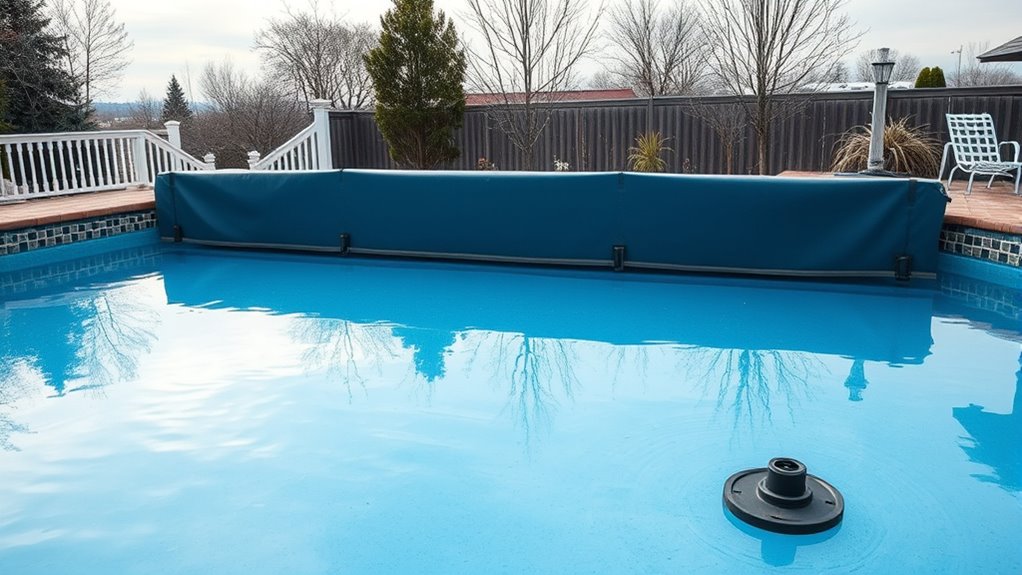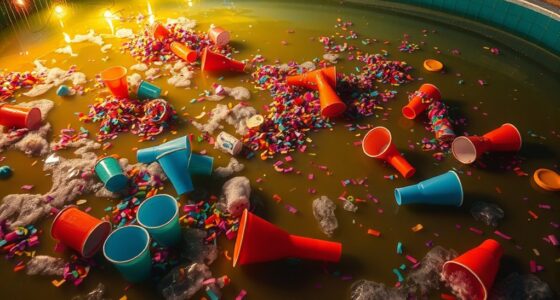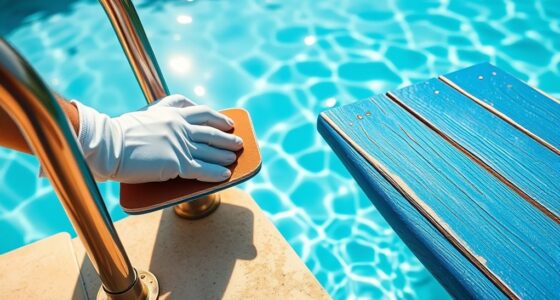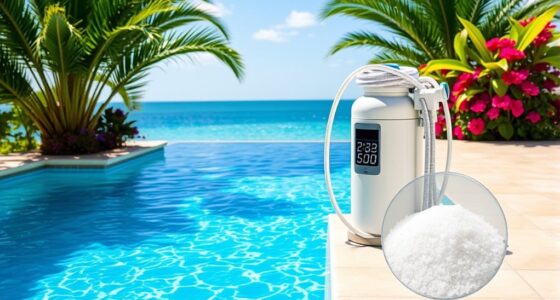To winterize your pool, start by removing debris and thoroughly cleaning the surfaces to prevent algae growth. Balance your water chemistry by testing and adjusting pH, alkalinity, and sanitizer levels. Lower the water level below the skimmer, then drain and store equipment like pumps and filters in a dry place. Add pool-specific antifreeze to plumbing lines, cover the pool securely, and perform final checks. Discover more tips to keep your pool safe all winter long.
Key Takeaways
- Clean and remove debris from water, surfaces, and equipment to prevent algae growth and ease spring reopening.
- Balance water chemistry by testing and adjusting pH, alkalinity, and sanitizer levels to protect water quality.
- Drain water from pumps, filters, and plumbing lines, then store equipment in a dry, sheltered area.
- Cover the pool securely with a sturdy cover and add non-toxic antifreeze to plumbing lines to prevent freezing damage.
- Inspect and maintain all pool equipment, addressing repairs and ensuring proper function before storage.
Clear and Clean the Pool
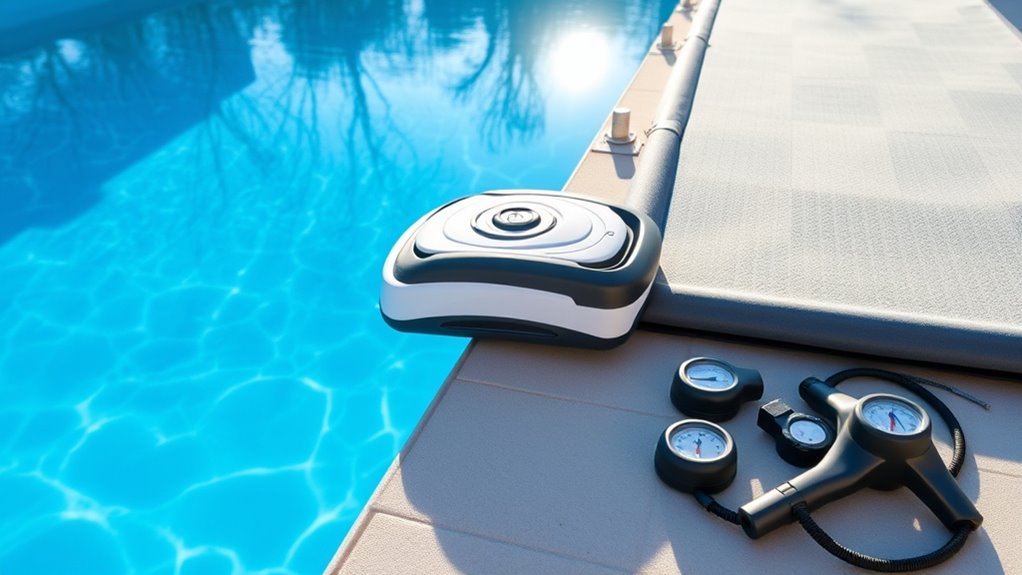
Have you ever wondered why a clean pool is essential before winterizing? It’s vital because a tidy pool prevents algae growth and keeps debris from clogging filters or damaging equipment during the off-season. Start by thoroughly removing leaves, twigs, and other debris from the water and pool surfaces. This debris can harbor algae spores and promote unwanted growth if left behind. Next, give the pool a deep clean, scrubbing the walls and floor to eliminate algae spores and dirt. Proper debris removal and cleaning create a pristine environment, making winterization easier and more effective. Additionally, filter maintenance ensures your filtration system functions properly during the off-season and prevents buildup that could cause issues later. Maintaining a clean, debris-free pool helps ensure you won’t face algae problems or costly repairs come spring. A well-prepared pool sets the stage for a smooth winterization process. Cleaning and maintenance are essential steps to preserve your pool’s longevity and ensure it’s ready for the next swimming season.
Balance the Water Chemistry
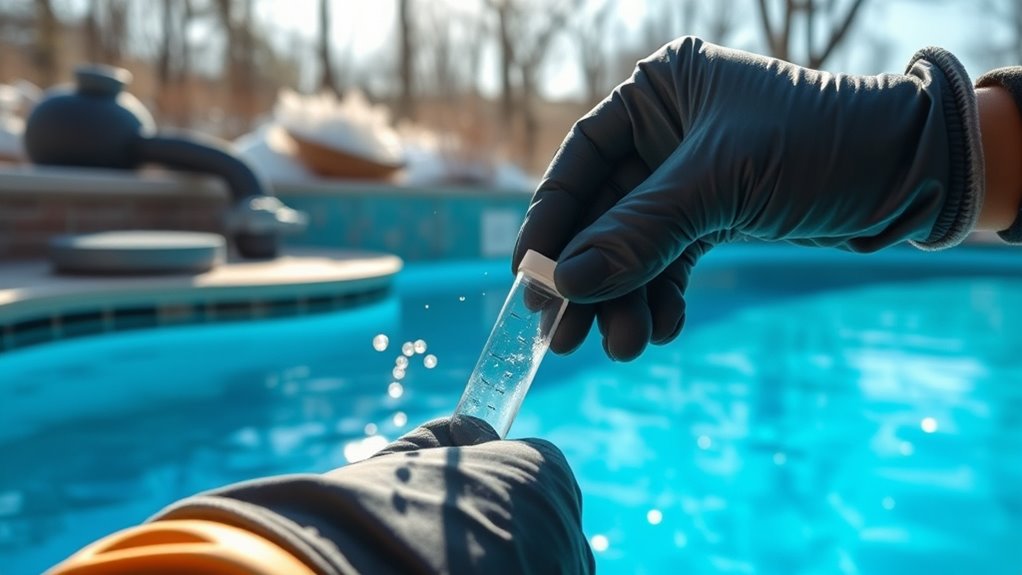
You need to test your pool water regularly to guarantee it stays balanced. Adjust the pH and alkalinity levels as needed to prevent corrosion or scale buildup during winter. Keeping these levels in check helps protect your pool equipment and keeps the water safe. Regular monitoring of water chemistry is essential for maintaining optimal conditions and preventing issues caused by imbalanced water chemistry. Incorporating advanced algorithms in testing devices can improve the accuracy and efficiency of your water analysis.
Test Water Regularly
Why is it essential to test your pool water regularly during winterizing? Because maintaining proper water chemistry prevents damage and keeps your pool in top condition. Regular water testing helps you identify imbalances early, ensuring chemical balancing stays on track. When you check the water often, you avoid surprises like corrosion or algae growth that can ruin your pool over winter. Additionally, understanding the importance of color accuracy in your pool’s water clarity can help you achieve a pristine, inviting appearance come spring. Staying informed about regional climate factors can also guide you in adjusting your winterization steps appropriately.
Here’s how you might feel when water testing is done right:
| Confident in your pool’s health | Peace of mind during winter | Pride in your maintenance skills |
|---|---|---|
| Step | Action | Tips |
| Apply antifreeze | Pour into skimmer and plumbing lines | Use non-toxic, pool-specific antifreeze |
| Cover the pool | Spread the pool cover evenly | Secure tightly to prevent wind damage |
| Final inspection | Check cover and antifreeze levels | Ensure everything is sealed and protected |
This combination safeguards your pool from winter damage and prepares it for spring reopening. Additionally, proper winterization techniques help ensure your pool remains in excellent condition through the cold months, especially when considering electric pool heaters or other energy-efficient options.
Final Inspection and Maintenance Checks
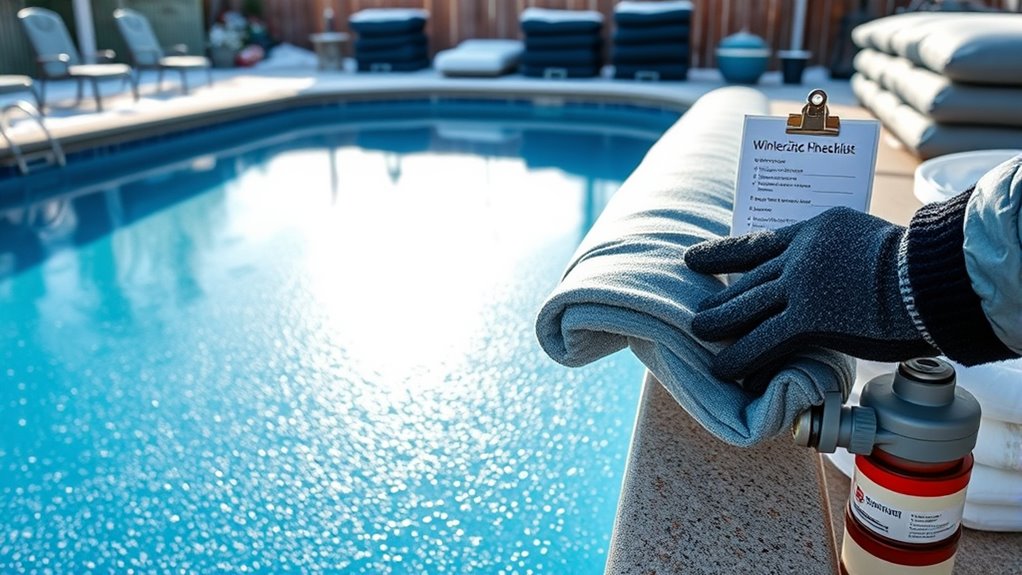
Before finishing your winterization, you should carefully inspect your equipment to guarantee everything is functioning properly. Confirm that your chemical levels are balanced to prevent issues come spring. Taking these final steps helps protect your pool and makes opening it easier later on. Additionally, consider reviewing your pool area’s lifestyle factors, such as outdoor furniture and decor, to ensure your space remains inviting and well-maintained during the offseason. Regularly checking your pool’s filter system and ensuring it is operating efficiently can also help maintain water clarity and quality over the winter months.
Inspect Equipment Functionality
As you prepare to winterize your pool, it’s essential to thoroughly inspect all equipment to make certain everything functions correctly. Check the pump operation to guarantee it runs smoothly without unusual noises or vibrations, which could indicate a problem. Confirm that the filter performs effectively by inspecting for clogs or debris and cleaning or replacing parts as needed. Verify that all valves and connections are secure to prevent leaks during the off-season. Look for signs of wear or damage on the pump and filter components. Testing equipment now helps identify issues early, saving you trouble later. Address any minor repairs before shutting down your system, ensuring your pool’s equipment is in good shape and ready for winter storage. Additionally, review the essential oils associated with pool maintenance, such as eucalyptus or tea tree oil, which can provide antimicrobial benefits during cleaning routines. Regular maintenance of pool equipment can extend its lifespan and improve efficiency, which is why understanding water treatment techniques is beneficial.
Confirm Chemical Levels
After confirming that your equipment is in good working order, the next step is to verify your pool’s chemical levels. Start with chemical testing using a reliable test kit or strips to check chlorine, pH, alkalinity, and stabilizer levels. Proper pH balancing is essential; aim for a pH between 7.2 and 7.6 to prevent corrosion or scaling during winter. Adjust chemicals as needed—add pH increasers or decreasers to achieve the correct balance. Ensuring proper chemical levels helps prevent algae growth, bacteria buildup, and staining. Double-check all readings, and make any necessary adjustments before closing the pool. Proper chemical confirmation now will safeguard your pool’s water quality and equipment over the winter months, making spring startup easier and more effective. Regular water testing throughout the season can also help maintain optimal water chemistry and prevent issues later.
Frequently Asked Questions
When Should I Start Winterizing My Pool?
You should start winterizing your pool when temperatures consistently stay below 55°F, usually in late fall. First, add winter chemicals to prevent algae growth and corrosion. Then, clean your pool thoroughly, balance the water, and lower the water level. Finally, cover your pool with a sturdy pool cover to protect it from debris and harsh weather. Starting early guarantees your pool remains in good condition throughout the winter months.
Can I Leave My Pool Partially Filled During Winter?
Leaving your pool partially filled during winter is like leaving a boat afloat in a storm; it can cause damage. You should drain it enough so the water doesn’t freeze and crack the pool, but keep enough to maintain the chemical balance. Always cover it with a secure pool cover to prevent debris. Proper winterizing, including balancing chemicals, keeps your pool protected and ready for spring.
How Do I Prevent Freezing Pipes in My Pool?
To prevent freezing pipes in your pool, you should run your pool heater consistently to keep the water circulation active. Maintaining proper chemical balance helps prevent buildup that could cause freezing issues. Additionally, insulate exposed pipes with foam or pipe insulation, and consider using a pond heater or de-icer if temperatures drop considerably. These steps make certain your pipes stay warm and protected throughout the cold winter months.
Is It Necessary to Remove All Pool Accessories?
You should remove all pool accessories to safeguard your equipment and maintain your pool’s appearance. Store items like ladders, cleaning tools, and decorative fixtures indoors or in a secure shed. A pool cover helps prevent debris and freezing water, but accessories left on can get damaged or cause damage to the cover. Removing everything ensures your pool stays in good shape over winter and makes spring reopening easier.
What Are the Signs of Winter Damage to Watch For?
You’d be shocked if you ignored signs of winter damage—your pool could turn into a giant ice sculpture nightmare! Watch for cracks, leaks, or warped surfaces, and check your pool cover maintenance for tears or sagging. Also, guarantee chemical balancing stays stable; imbalances can cause corrosion or algae growth even in winter. Catching these issues early keeps your pool safe and ready for summer fun, avoiding costly repairs.
Conclusion
By following these steps, you’ll have your pool ready to weather the winter months. Taking the time to properly winterize guarantees your pool stays in great shape and saves you headaches later on. Remember, a stitch in time saves nine—don’t wait until spring to regret neglecting your pool. With a little effort now, you’ll be back to splashing in a sparkling pool when the weather warms up again. Stay proactive, and enjoy a worry-free winter!
